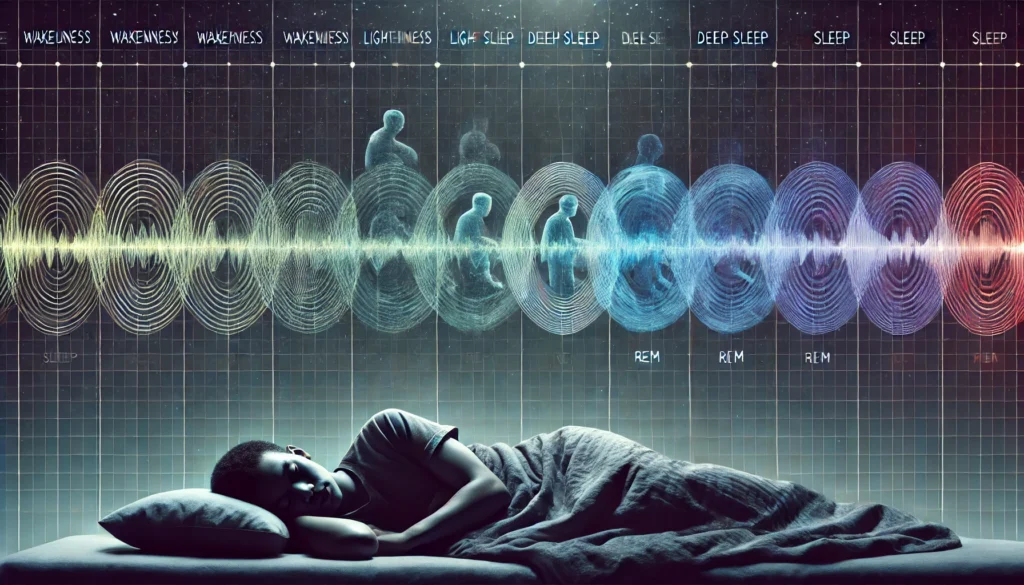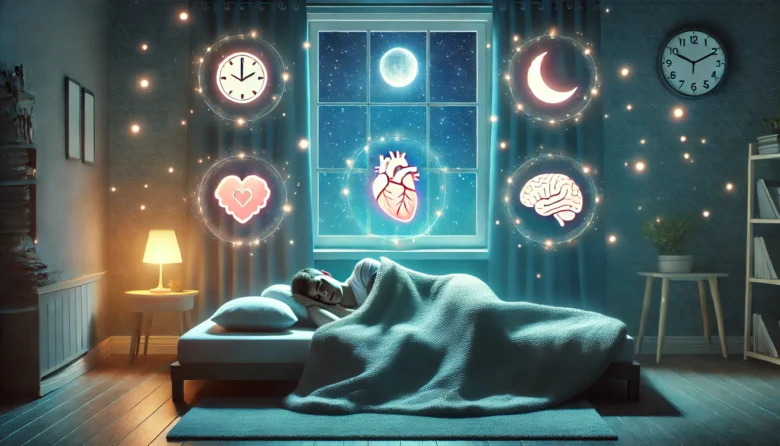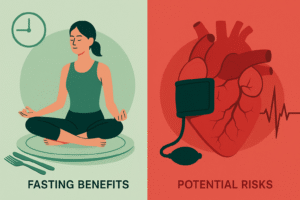Have you ever woken up feeling incredibly refreshed after a night of deep sleep or groggy after a strange, vivid dream? These experiences are all linked to different phases of sleep, known as REM (Rapid Eye Movement) and Non-REM (Non-Rapid Eye Movement) cycles. In this blog, we’ll dive into the science of sleep to understand these cycles and why they are essential for our health and well-being.
The Importance of Sleep
Sleep is often seen as just a time of rest, but it’s so much more than that. During sleep, your body and brain perform vital functions that keep you healthy, both physically and mentally. From consolidating memories to repairing tissues, sleep is the body’s natural way of hitting the refresh button.
We go through different stages of sleep every night, moving between REM and Non-REM phases. These stages serve distinct purposes and together form the complete sleep cycle.
What Are Sleep Cycles?
Sleep is divided into cycles, which are broken down into REM and Non-REM phases. Each complete cycle lasts about 90 minutes, and an average adult goes through 4-6 of these cycles each night.
Non-REM Sleep is the first part of the cycle and includes three stages of increasingly deeper sleep. These stages allow the body to rest, repair, and rejuvenate. On the other hand, REM Sleep is when most dreaming happens, and it plays a crucial role in cognitive functions like memory and problem-solving.
Let’s break down each phase of sleep in more detail.

Non-REM Sleep: The Quiet, Restful Phase
Non-REM sleep is divided into three stages, each with its unique characteristics:
Stage 1: Light Sleep
This is the phase where you’re just starting to drift off. Your eyes are closed, but it’s still easy to wake up. You might experience that odd sensation of “jerking” awake, which is your body’s way of shifting into sleep mode.
Stage 2: Intermediate Sleep
At this stage, your heart rate slows, your body temperature drops, and you begin to sink deeper into sleep. Your brain produces something called sleep spindles, which are rapid bursts of brain activity that help you transition into deep sleep.
Stage 3: Deep Sleep (Slow-Wave Sleep)
This is the phase of sleep that is most physically restorative. Your brain waves slow down, and it becomes harder to wake up. Deep sleep is when your body repairs tissues, strengthens the immune system and recharges for the next day. This stage is particularly important for athletes or anyone recovering from physical exertion.
REM Sleep: The Dreaming Stage
After completing a cycle of Non-REM sleep, you transition into REM sleep. During this phase, your brain becomes more active, almost resembling its waking state. However, your body remains still, thanks to temporary muscle atonia, which prevents you from acting out your dreams.
This stage is often associated with vivid dreams, but it does much more than just entertain your sleeping mind. REM sleep plays a crucial role in learning, memory consolidation, and emotional processing. It’s during this stage that your brain sorts through information, deciding what to store as long-term memory and what to discard.
The Balance Between REM and Non-REM Sleep
So, why do we need both REM and non-REM sleep? Think of it this way: Non-REM sleep is like putting your body into “maintenance mode,” allowing it to repair and recover physically. REM sleep, on the other hand, is like rebooting your brain. It’s essential for mental and emotional well-being.
People who don’t get enough deep, restorative sleep may feel physically drained, while those who miss out on REM sleep may find themselves mentally sluggish or emotionally imbalanced. Both phases are essential for overall health.
Real-World Examples: The Impact of Sleep Deprivation
Take the example of students during exam season or professionals working long hours. Many people tend to cut back on sleep during these periods, thinking they can make up for lost time later. However, sleep deprivation has immediate and long-term consequences.
Missing out on deep Non-REM sleep leaves your body feeling physically exhausted, while skipping REM sleep leads to problems with memory, focus, and emotional stability. Studies have shown that individuals who don’t get enough REM sleep are more likely to struggle with problem-solving, have emotional outbursts, or even experience heightened anxiety and depression.
One famous case study involved Randy Gardner, who in 1964 set the world record for the longest time without sleep—11 days! While he didn’t experience any long-lasting damage, Gardner reported severe cognitive impairments, mood swings, and hallucinations. This case highlights the vital role sleep plays in maintaining mental and emotional balance.
Case Study: Athletes and Deep Sleep
Elite athletes often prioritize sleep as part of their recovery routines. Consider tennis star Roger Federer, who famously sleeps up to 12 hours a day during tournaments. He focuses on getting plenty of deep, Non-REM sleep to allow his muscles to repair and strengthen. Research indicates that athletes who make sleep a priority tend to perform more efficiently, recover more quickly, and have a lower risk of injury.
The Science Behind REM and Non-REM Cycles: What Happens in the Brain?
During Non-REM sleep, especially in the deep sleep stages, your brain produces delta waves—slow brain waves that signal your body to go into full recovery mode. This is the period when growth hormone is released, aiding in tissue repair.
In contrast, during REM sleep, your brain shows a lot of electrical activity. Brain scans of people in REM sleep show patterns similar to when they are awake, especially in areas associated with emotion and memory. This activity is thought to help process emotions and reinforce learning from the day.
Why Is Sleep Important for Mental Health?
Sleep isn’t just about feeling rested; it’s about emotional regulation and mental clarity. In fact, a study published in the journal Sleep found that individuals who got sufficient REM sleep were better at managing stress and more resilient in the face of challenges.
Poor sleep has been linked to conditions like anxiety, depression, and even bipolar disorder. This highlights the importance of good sleep hygiene—not just for your body but for your mental well-being as well.
Improving Your Sleep Cycles
Now that you understand the importance of REM and Non-REM sleep, you might be wondering how you can improve your sleep quality. Here are a few tips:
Stick to a Schedule: Try to go to bed and wake up at the same time every day, even on weekends.
Create a Relaxing Environment: Keep your bedroom dark, quiet, and cool to promote better sleep.
Limit Screen Time: The blue light emitted by phones and computers can interfere with your body’s production of melatonin, a hormone that regulates sleep.
Avoid Stimulants: Caffeine and nicotine can keep you awake, so it’s best to avoid them in the hours leading up to bedtime.
Practice Relaxation Techniques: Meditation, deep breathing, or reading a book can help your mind wind down and prepare for sleep.
Conclusion
The science of sleep, specifically REM and Non-REM cycles, is more than just fascinating—it’s essential to our well-being. By understanding the distinct roles of these sleep phases, we can take steps to improve our sleep quality and, in turn, our physical and mental health. So, the next time you find yourself tossing and turning, remember that a good night’s sleep is your body’s way of restoring balance and preparing you for the day ahead.
Sleep well, and let your body and mind work their magic!
Author’s Note
Sleep is one of the most important aspects of health, yet it’s often the first thing we sacrifice when life gets busy. As someone who has struggled with finding the right sleep balance, I hope this blog serves as a reminder of the value of good sleep.
G.C., Ecosociosphere contributor.
References and Further Reading
- Neurobit Research Blog | Exploring the Different Stages of Sleep. https://www.neurobit.com/blog/researchblogs/exploring-the-different-stages-of-sleep
- What are the different stages of sleep? – FITPAA. https://www.fitpaa.com/blog/what-are-the-different-stages-of-sleep/
- Sleep Cycles – Sleep Education. http://school.sleepeducation.com/sleepcycles.aspx
- Let’s sleep well! Here is everything you need to know.. https://blog.wellcare-global.com/sleep-well-here-is-everything-you-need-to-know
- Sleep Disorder: A Common Problem of Today. https://www.healthmad.com/fitness/sleep-disorder-a-common-problem-of-today
- 7 Science-Backed Tips to Sleep Better | Sure Keto. https://sureketo.com/guides/7-science-backed-tips-to-sleep-better
- Simple Tips On How To Maintain A Fixed Sleep Schedule. https://www.idiva.com/ampstories/health-wellness/well-being/on-world-sleep-day-here-are-simple-tips-that-help-maintain-fixed-sleep-schedule/18053908
- Sleep and Heart Health: Protecting Your Heart through Healthy Sleep Habits | Atlas Bar. https://atlasbars.com/blogs/sleep-explained/sleep-and-heart-health-protecting-your-heart-through-healthy-sleep-habits




